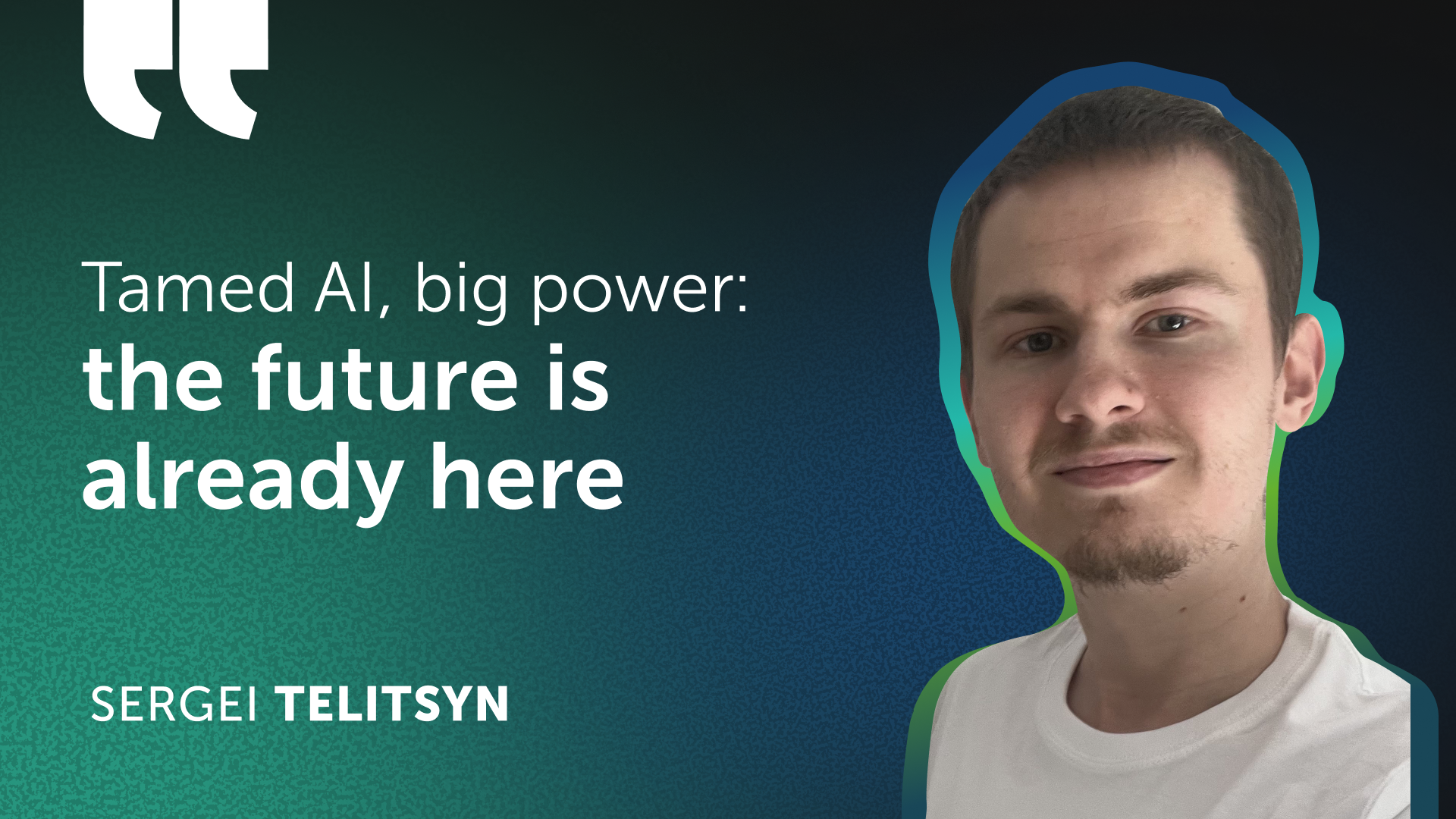Tamed AI, big power: the future is already here
Together with FR Media, we’re continuing our series of inspiring stories from tech experts about their journey into AI. Sergei Telitsyn, a Senior Software Engineer at EPAM, shares his thoughts on how AI is reshaping our world.

“I’ve observed the evolution and degradation of AI ideas”
— I’m a Senior Java Software Engineer, currently working as a software development team leader. My active project has significantly shaped my modern vision of AI. Here, I’ve had the opportunity to observe the evolution — and sometimes the degradation — of AI ideas and implementations.
For example, when OpenAI introduced structured output, it initially seemed like a miracle that could eliminate the need for fallback mechanisms. However, as time went on, the models began to hallucinate more frequently, and we had to return to using fallbacks for handling LLM outputs.
I’ve observed the evolution of models like GPT-3, GPT-3.5, GPT-4, and GPT-4o, as well as their occasional degradation over time. Under equal conditions, we sometimes noticed a decline in the quality of responses from the models, which required additional prompt tuning to achieve the desired results.
AI has fundamentally changed the way we approach engineering tasks. It has replaced most of my Google searches and completely eliminated the need for Stack Overflow in many cases. AI proposes ideas that might otherwise be overlooked because, as humans, we often don’t know what we don’t know.
Another intriguing shift is how managers have started stepping into engineering processes. They now write code, conduct code reviews, create proofs of concept, and offer valuable proposals. Initially, this involvement faced challenges—our first attempt resulted in a merge request with over 50 issues. But over time, the quality has vastly improved, and now this activity provides significant support to our engineering team, making collaboration more effective and impactful.
My journey into AI began with my first attempts to run large language models (LLMs) locally. From there, I started developing a full-scale local inference server. It’s a spacious field for experiments — private and mostly free.
“I said, “I’m tired” and my smart home adapted instantly”
— One of my biggest “wow” moments with AI happened when my smart home reacted to a casual phrase I said: “I'm tired and suffer from a lack of concentration.” It adapted instantly, enabling the air conditioning in the room where I was sitting, adjusting the lights to a cooler temperature, and playing a concentration playlist on my table speakers. On top of that, it suggested slightly opening a window in another room, as carbon dioxide levels were high. That moment made me believe the future is already here.
“I hope AI won’t take away our engineering jobs”
— Looking ahead, I hope AI will discover something entirely new and push us beyond the boundaries of classic software engineering — perhaps even enabling a brain-to-code interface.
On a more practical note, I believe AI will soon become trustworthy enough to fully handle mundane administrative tasks like JIRA ticket lifecycles, project-specific code reviews, and documentation writing. This shift would free up engineers to focus on creativity, experiments, and engineering trials.
At the same time, I hope this evolution won’t take away our engineering jobs — or punish those who, metaphorically speaking, still love horses in an era of cars, planes, and spaceships.
“Tamed AI is a big power to transform the way we work”
— My advice for staying confident in an AI-powered workplace? Admit that things won’t go back to the way they were. Tamed AI is a big power to transform the way we work.
Knowledge about how to work with — and through — AI is crucial. Although AI is still inferior to humans (as of today), it can already spark bright ideas and help us think outside the box. If you’re looking for resources to deepen your understanding of AI, I recommend the r/LocalLLaMA community on Reddit and Hugging Face. If you’re looking for resources to deepen your understanding of AI, I recommend the r/LocalLLaMA community on Reddit and Hugging Face.
That specific subreddit offers a fresh perspective and detailed comparisons on different LLMs and machine learning in general. You can find useful whitepapers, advice for local usage, and a broad field of exploration: from the best settings for each model to ideas and examples of agentic flows, or even ready-to-use implementations.
Hugging Face is a resource where you can review, download, or try different neural networks, which aren’t limited to just LLMs. It’s a goldmine for exploring models, datasets, and tools across a wide range of applications.
And I believe certain human skills will become even more important. Among them, a broad worldview, technical intuition, and a belief in endless opportunities and open doors are key.
“We are not AI — food and sleep are crucial for creativity”
— Staying focused and creative while working with AI comes down to motivation. I’m surrounded by news and opinions about AI, which keep me inspired and focused.
Having an AI lab at home lets me try different ideas and reignite sparks lost in daily life. Apple Music playlists and sound generation apps help when ad-hoc inspiration is needed.
But beware — we are not AI. Food and sleep are crucial for maintaining focus and creativity.
“Upgrade and Detroit: Become Human are thought-provoking”
— My favorite AI-related movie is Upgrade (2018). It presents mind-blowing ideas about smart assistants and AI with shocking plot twists. Each year, those ideas are being implemented in modern life, making the movie feel like a prophecy or forecast.
On the interactive side, Detroit: Become Human (2018) is an incredible game that raises thought-provoking questions: Where is the line between humanity and AI cyborgs? Do they need ethics, rights, and respect? How will they impact our lives? Looking at Tesla’s Optimus Gen 2 and its competitors, these questions aren’t science fiction anymore — they’re perspectives on reality.

_(1).png)
.png)